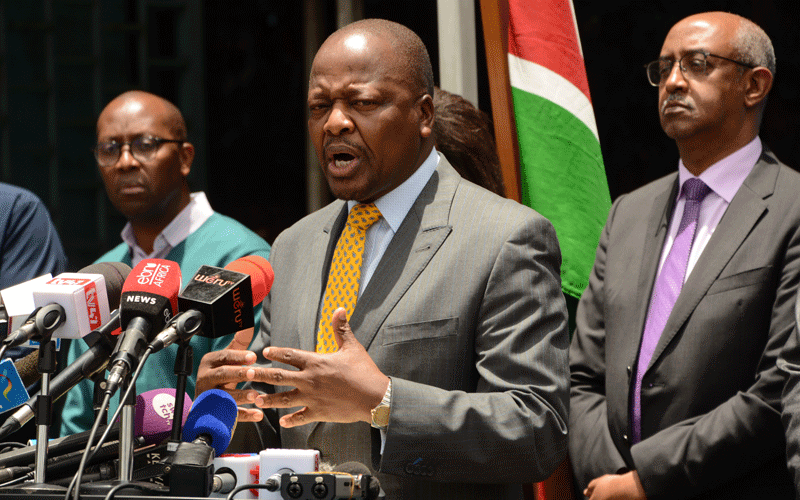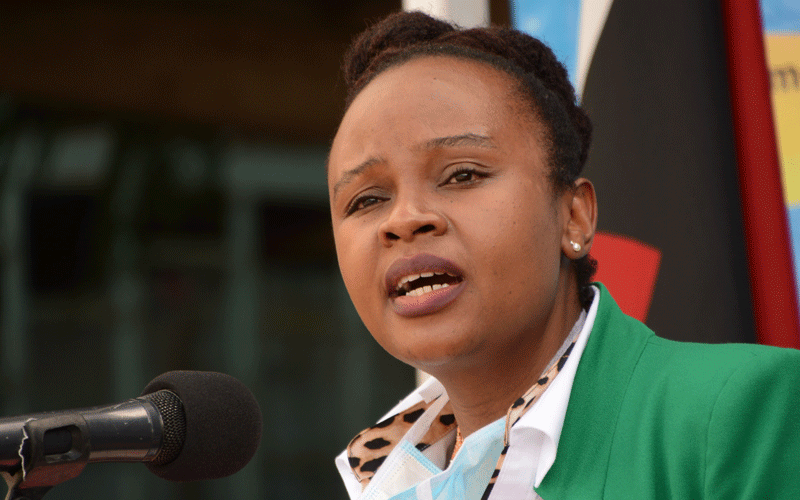Mass testing key in war on Corona, say health experts
By People Team, April 23, 2020
Health Cabinet Secretary Kagwe warns Kenyans against celebrating the low virus cases recorded so far since only mass testing would help country establish its true north, scientist says Kemri ready to carry out mass testing
Noah Cheploen, Barry Silah and George Kebaso
As the country enters the most crucial stage in the fight against coronavirus, the government has sounded the alarm that the number of infections could rise exponentially in coming days.
One of the biggest challenges in the fight against Covid-19 has been the country’s limited testing capacity because of shortage of equipment.
By yesterday morning, only 14,417 samples had been tested. The number of tests per day reduced drastically on Tuesday to 545 from 1,339 samples collected on Sunday.
By yesterday afternoon the number of positive cases was at 303.
However, the situation is likely to change dramatically after Kenya received hundreds of thousands of testing kits, with experts saying besides social distancing, mass testing could be the game changer in the fight against the pandemic.
Health Cabinet Secretary Mutahi Kagwe, who has warned Kenyans against celebrating the low coronavirus cases recorded so far, says mass testing will help the country establish its true north, the accurate figures in the virus spread, by either revealing an exponential growth or successful containment, and help the government take appropriate action.
Addressing the media yesterday, President Uhuru Kenyatta said testing kits were a challenge, but expressed optimism that the country will scale up testing in target areas.
He said Kenya expects to be testing as many as 2,000 people a day by this weekend.
“We are expanding our testing capacities. We started testing 10, 20 people. Now, we have gone to as many as 1,000 people in 24 hours.
And we are going to keep increasing these numbers,” said the President, adding: “We will do targeted testing based on estates where we have reported many cases.

We will also do one for our health workers. We have just done one at the Kenya Ports Authority. What we need to do now is scale up.”
Uhuru’s remarks came as health experts say getting the correct picture of the country’s pandemic status is crucial in guiding decision-making by the government.
Devolve testing
And briefing the press on Wednesday, Health Chief Administrative Secretary (CAS) Dr Mercy Mwangangi warned of an emerging trend showing that the infections are growing in communities with Mombasa again recording seven out of the 15 new cases reported that day.
Already, Kagwe has announced that the first phase of mass testing is already underway, targeting high-risk groups such as health workers, specific institutions, regions and hot spots such as slums, quarantine and isolation centres.
In his briefing on Tuesday, Kagwe announced that plans are at an advanced stage to ensure that testing is devolved to the counties.
He said every county will have a certified laboratory to test Covid-19 soon. He added that testing has been slowed down in the last two days because of the global shortage of one of the components.
An expert in infectious diseases, Paul Yonga, concurs saying mass testing will ensure a more accurate and apt response to stem spread of the deadly respiratory flu that has infected over 2.5 million and killed more than 171,000 globally.
“It’s certainly the only way we can be able to address this worrying trend in a more accurate and responsible manner.
As it is, some might be happy that numbers are not as high but since the disease is symptomatic, we would be able to come up with more figures that can help the authorities narrow down on answers,” said Yonga.
“It will be an important exit strategy for the lockdown which does not exactly solve the problem but once we map out hotspots and testing strategies are clear, we will be getting to solutions,” he told People Daily.
On the relatively low infection numbers, Kagwe has warned that countries such as Italy and Spain reported similar numbers within the first one-and-half months of the pandemic only for the cases to rise dramatically.
“Let me send out a word of caution; we are not out of danger yet. A comparative review of countries now being overrun by the virus shows that they were reporting similar figures as we are now,” he said.
Test staff
“You will note that our 4.6 per cent death rate is within the global range of 6.3 per cent. Our figures should, therefore, not delude or deceive you into dropping the ball,” said Kagwe at one of his briefing sessions.

Studies in Italy, Spain, the US and UK have shown that cases of coronavirus follow a similar pattern where they peak at around the 40th day from the detection of the first case and start dropping steadily from the 70th day.
Kenya Medical Research Institute scientist Matilu Mwau says mass testing is one of the four critical pillars being used successfully to help address Covid-19.
“Mass testing, which has shown success in countries such as South Korea and Thailand, ranks together with the other three pillars; quarantine, isolation and contact tracing.
“Therefore, this pillar is used to identify possible pockets of infections and truncate them. In Kenya, for instance, we would want to focus on KPA, where we would like to test all staff and people who visit the facility; healthcare workers dealing with patients, and even go to villages such as in Siaya where something has happened,” he said.
The Health ministry has so far sent more than 1,000 testing kits to the Port of Mombasa.
Mwau said the government is also likely to target certain apartment blocks “in order to pull out suspected Covid-19 cases to curb further spread”.
He said there would also be need to decontaminate targeted estates.
On preparedness, Mwau said Kemri was ready to carry out mass testing.
“I feel that now we are more flexible to carry out mass testing with the reagents that have arrived in the country.
In fact, we are capable of doing up to 6,800 tests from just one reagent. The testing gap is closing significantly,” he added.
Yonga has called for enhanced capacity in existing facilities so that any anticipated increase can be well handled.
“At the moment, we are heavily relying on Kenyatta National Hospital and Mbagathi Hospital which is not adequate.
Ideally, with a good run, we should have done 100,000 tests but now with a testing capacity of 20 per cent,” he said.
In Nakuru, Health Executive Kariuki Gichuki said mass testing will give the real situation in the country.
“We welcome it because at the moment only those with symptoms are being tested,” he said.
Gichuki said the numbers are likely to rise because there might be many people out there who are asymptomatic.
“It is like HIV, you might be having it but if you’re not sick you cannot tell until you’re tested,” he said.
But Baringo county Health chief officer Gideon Toromo, a former deputy director of medical services, said though a welcome measure, the country might not have the capacity for mass testing.
“It is not going to be easy. What I think they are going to do is to test people in specific areas that are considered hotspots,” he said.
He, however, warned that the numbers will rise in the coming days. “It doesn’t look good especially seeing what is happening in other countries,” he said.
So far, there are only four laboratories approved to test Covid-19 in the country: they are located in Nairobi, Kisumu, Kilifi and Mombasa. Moi Referral and Teaching Hospital in Eldoret is expected to start testing, too.
Follow guidelines
Addressing the nation on April 16, one month after the first case was reported, President Uhuru said the deadly virus has spread through almost half of Kenya’s 47 counties.
“Our measures are slowing the rate at which the disease is spreading, but we must be honest and say that there are still infections underway in nearly half of our counties,” said the President.
The number of coronavirus patients has been increasing steadily over the past close to one- and-half months with infections now being reported within communities, an indication that it is taking an alarming curve unless Kenyans begin to adhere to the ministry’s guidelines and other protocols to curb the spread.
Nairobi leads with 73 per cent of cases detected so far followed by Mombasa, Kilifi and Mandera according to figures released three days ago.
Other counties affected by the highly contagious disease include Homa Bay, Kajiado, Kakamega, Kitui, Mandera, Nakuru, Siaya, Uasin Gishu and Kwale.
In Nairobi, for instance, the cases are spread in almost all estates, Kagwe said. Some of the estates cited are Kilimani, Pipeline, Karen, South C, Kawangware, Tassia, Utawala, Kitisuru, Parklands, Buru Buru and Kibra.
“Almost every other city estate has reported at least one case- Donholm, Eastleigh, Hurlingham, Lavington, Runda, Ngara, Madaraka, Kasarani- and many more,” CS Kagwe said.
As the number of cases rises, President Uhuru yesterday said: “Those that think this disease does not exist: for the safety of your family, and your loved ones, do that is necessary to protect them. Stay away. Do not put people at risk because you do not think it is serious.”
He reiterated that many Kenyans are “deliberately taking lightly the threat of Covid-19”, adding that those who recently escaped quarantine at KMTC will be arrested and forced to complete the mandatory isolation period.
“What we have said is that those breaking the regulations we have given, no need to take them to the police station.
Let them be taken to mandatory quarantine. If they break those rules again, take them back. We cannot have a few people erode the efforts we have made,” he said yesterday.
“For those that escaped, we will get them and they must finish their quarantine period. We know you and we will find you. You can’t be a burden on law abiding Kenyans if you were found violating curfew measures to tame Covid-19,” he said.